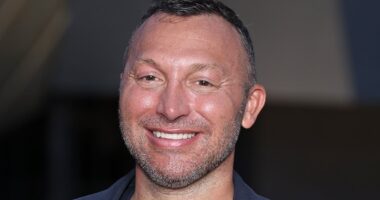KAREN Read has enlisted a new addition to her defense team for her upcoming retrial, a move that could potentially make a significant difference in securing an acquittal, according to a statement from a lawyer.
Heading into her second trial concerning the 2022 death of her boyfriend John O’Keefe, a police officer from Boston, Read has included a fresh face in her defense legal team—a prior alternate juror from her first trial.




Read is facing allegations of intentionally driving her SUV in reverse into O’Keefe on January 29, 2022, following a night of heavy drinking, and then allegedly abandoning him to die in a snowbank in Canton, Massachusetts, a town near Boston.
The adjunct professor, 45, and her defense team have denied the accusations, arguing she’s the victim of a cover-up by local law enforcement officials, who they claim were responsible for O’Keefe’s death.
The first trial, which stretched nine weeks and consisted of more than 65 witness testimonies, ended in a hung jury after jurors returned multiple times telling Judge Beverly Cannone they could not reach a verdict.
Cannone declared a mistrial, setting the stage for the high-profile retrial.
Read has assembled a legal dream team, which includes attorneys Alan Jackson, David Yannetti, Elizabeth Little, Robert Alessi, and most notably Victoria George, who served as an alternate juror in the initial trial last April.
George, a licensed civil attorney in Massachusetts who is now working for Yannetti’s law firm, joined Read’s defense team days before jury selection in the retrial was set to begin.
‘INVALUABLE ASSET’
She told Vanity Fair she joined the group of pink T-shirt loyalists advocating for Read’s innocence after leaving the first trial “wary, distrustful, and scared” of Massachusetts’ legal system.
“What happened to John O’Keefe was a tragedy,” George told the magazine.
“But just because something is sad doesn’t mean that the person in the defendant’s seat is responsible. I can feel bad for his family and believe she’s not guilty at the same time.”
Benjamin Urbelis, a trial attorney at Urbelis Law in Massachusetts, described George’s presence on Read’s defense as an “invaluable asset.”
“I think it’s absolutely a smart move by Karen Read and by her defense team,” Urbelis told The U.S. Sun.
“I don’t believe that Victoria George was brought in necessarily for her criminal defense acumen. It doesn’t appear that that’s her speciality, but she has a very unique perspective.
“She was obviously a juror, a sitting juror in the first trial, so she understands the tenor of that courtroom, especially in a trial like this.
“She understands what it’s like to feel as a juror sitting through a trial like this.”
Urbelis continued, “She understands how jurors perceive the witnesses, perceive the evidence, perceive most importantly, perhaps, the lawyers as they advocate for each of their sides.
“And she also, being an attorney herself, understands maybe another perspective on how to apply their defense case, given all of those considerations that sitting jurors might have.
“So, I think it’s an invaluable asset to the defense team. And as a trial lawyer in any case, especially a case like this that’s so complex, it’s always good to have multiple perspectives.”



RUDE AWAKENING
George underscored to Vanity Fair how several questionable, and “potentially unconstitutional,” decisions by Judge Cannone led to her joining Read’s team.
One was the egregious and sexist text messages by disgraced lead investigator Michael Proctor, where he called Read a “whack job and b***h” who should “just kill herself.”
The second instance for George came when Cannone dismissed a juror days before the start of closing arguments after Massachusetts State Police officer John Fanning reported the juror appeared to be “sympathetic to the defense.”
Fanning, who the defense said was one of Proctor’s supervisors and was also in the group text chain, reported the incident to the judge but said he had not personally witnessed the event, according to Vanity Fair.
Despite defense attorney Alan Jackson’s filing a motion to dismiss Fanning’s claims, citing no evidence presented, Judge Cannone sided with state prosecutors.
“I waited for nearly a year after the mistrial, hoping the court system would work as intended to remedy some of the wrongs in this case,” she told the magazine.
Urbelis told The U.S. Sun those moments for George were a rude awakening for a young attorney.
“I thought that was very interesting. It seems that she doesn’t have much experience as a criminal lawyer,” Urbelis said.
“But I often look at how I was in law school, and when I see young lawyers coming out of law school, we’re very optimistic, and we see the legal system in a certain way that after years of practice, we might see that that’s not always the case.
“I think that this might have been a very awakening experience for Victoria George, seeing that the system didn’t exactly play out how she would have expected or how she would have hoped as an attorney, or a legal professional.
“I can’t speak as to why she joined the defense team, but it seems that that might be a big factor that she wanted to provide any assistance she could to make sure that Ms. Reid gets a fair trial this time around, because apparently Victoria George did not feel that that was the case last year.”



SUPREME COURT PETITION
On Tuesday, Read’s defense team filed a petition with the Supreme Court, asking the justices to overturn two charges against her on double jeopardy grounds.
Under the Constitution’s Fifth Amendment, the double jeopardy clause prohibits anyone from being prosecuted twice for substantially the same crime.
Read’s attorneys asked the court to dismiss her charges of second-degree murder and leaving the scene of a collision causing injury or death.
The defense argued that after the first trial, jurors told them they came to an agreement that Read was not guilty of the two charges, but remained split on the manslaughter charge.
Read’s lawyers argued that because the jury’s deadlock “was limited to one of the three counts rather than all” she should not have to fight the charges again.
“In sum, the defense learned post-trial that the jury reached a verdict that was not announced,” the petition read.
“It was at least entitled to the opportunity to substantiate that fact in order to ensure Read is not unconstitutionally forced to stand trial for criminal offenses, including murder, of which she has already been acquitted.”

















